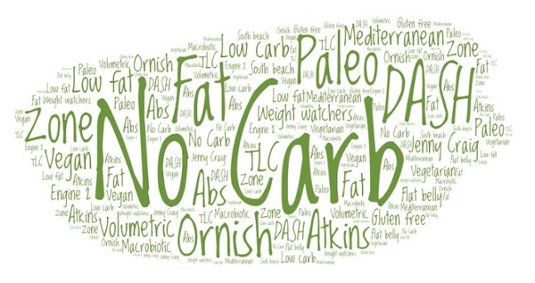About 15 years ago, the Atkins Diet was starting to catch on like wild fire. I first learned about it from a doctor friend who said he was losing weight by eating mostly meat, cheese, and eggs. “You can’t lose weight on a high-fat diet” I insisted, but there really wasn’t much evidence to back me up. At that time, there were more than 1,000 diet books on the market which begged the question —Is one diet better than all the rest?
To help answer this question, I found an expert in nutrition and heart disease, Dr. Ernst Schaefer and research dietitian, Joi Gleason, RD who had an interest in comparing different eating strategies. We posed an expanded question, “Is one diet better for weight loss and heart disease risk reduction?” That’s when the Tufts Popular Diet Trial was born.
We recruited 160 overweight men and women with heart disease risk factors (such as high cholesterol, blood pressure, or blood sugar) and randomly assigned them to follow one of four different eating plans for a year. The four diets were Atkins (low carb), Zone (moderate carb), Weight Watchers (moderate fat) and Ornish (very low fat vegetarian). Participants kept food logs so we could measure how well they were following their diet. We tested participants several times during a one-year period to find out how these different diets impacted cholesterol and other heart health factors.
The results showed a four-way tie between the diet groups! The average one-year weight loss was about 8 to 10 pounds in each diet group. Those who liked their assigned diet and were able to follow it closely, often lost much more than 10 pounds—for example 30 or 40 pounds. The more closely participants followed their eating plan, the more weight they lost. Weight loss, in turn, improved heart disease risk factors like cholesterol, blood pressure, and blood sugar levels. Many people who were unable or unwilling to follow their assigned diet, dropped out of the study.
So what’s the final conclusion? One diet is not better than all the rest. There are many good eating strategies for weight loss and heart disease risk factor reduction—as long as you can stick to it!
Today there are more than 100,000 diet books available on Amazon. Low-carb, no carb, paleo, vegan, Mediterranean, gluten-free, the list goes on and on. Each of these eating strategies has its own special set of advantages and disadvantages—strengths and drawbacks. But, several things are common to all of these eating strategies. All of them embrace a diet rich in vegetables and limit added sugars and overly processed packaged and fast foods.
When choosing the best eating strategy for yourself, consider these two things:
- What works for one person, may not work for you. You’re unique. You have your own food preferences, medical situation, metabolism and lifestyle.
- Look for a way of eating that you feel you can maintain for a long time, one that doesn’t feel too restrictive and isn’t a total reversal of your current eating habits.
The best diet is one that you can stick to, the one that isn’t like dieting at all, but a way of life.
Want a personalized nutrition and life plan to help you improve your heart health?
